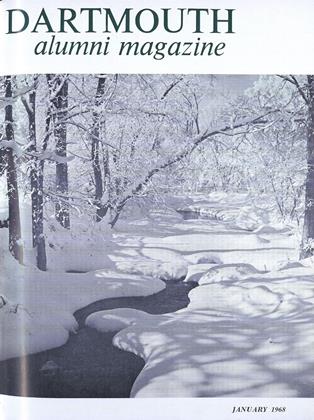When Ford's Theater reopens in Washington this month, launching a new repertory company in the theater where Abraham Lincoln was shot, a notable guest will be GEORGE FORD '03 of La Canada, Calif. Mr. Ford's uncle operated the Washington playhouse and his father, Harry Ford, was the manager on that fatal night of April 14,1865.
This bit of family history is inescapable in any article about George Ford, but the more vital fact is that the theater has been his meat and drink all his life. His has been a theatrical family for over 250 years.
His mother's ancestors, the Chapmans and the Drakes, won acting fame on two continents, beginning with his great-great-great-grandfather Thomas Chapman who performed with the original 18th Century company in the Drury Lane production of The Beggar's Opera. With the wane of Shakespearean drama, the Chapmans and Drakes emigrated to America where the Chapmans originated the showboat and presented the forerunner of the minstrel show. The Drakes were prosperous California troupers during the Gold Rush days.
That this dramatic history is well known to theater buffs is attributed to the success of George Ford's very readable and popular chronicle TheseWere Actors, published in 1955. Variety - in what was Variety-style high praise - lauded it as "OK Show Biz Book."
Though he made a cliche stage appearance at three months in his mother's arms, George did not follow her in an acting career. (She was Blanche Chapman who played leads opposite Edwin Booth and was the heroine in several American productions of Gilbert and Sullivan.)
But he has done almost everything else in the theater - producing, managing, writing. His Broadway production of Rodgers' and Hart's first effort, Dearest Enemy, starred his actress wife Helen Ford, who at the peak of her career held a popular place on the American stage comparable to Ethel Merman's in more recent years.
As a manager he signed over 200 booking contracts. The Fritz Leiber Shakespeare troupe he headed featured an actor named Sidney Greenstreet. He managed three ballet companies, including the famous Ballet Russe de Monte Carlo.
Though none of his scripts was a big Broadway success, he has been well enough received to criticize today's playwrights. "The old writers never had to rely on bizarre or perverted themes," he says. "Plays are not good now and neither are the actors."
"They have the gifts but not the training. . . . What happens today? A homely, skinny girl comes into New York and the critics rave. And we get a succession of homely, skinny girls."
He prefers dancers.
"Ballet people," he says, "are very easy to get along with, considering what they go through. It's the hardest work in the world."
Show business friends have enjoyed the stories told by this unassuming, histrionic historian for years and labeled him "Mr. Legitimate Theater." His years on the road with the ballet company were rugged, but they provided this humorous, affable man with some of his best anecdotes. Consider the case of the drunk he told one night, "You can't go in there—you're drunk."
The man replied, "Do you think if I was sober I would want to see this show?"
Among his most vivid memories is the account of the Lincoln assassination as told by his father. It was Harry Ford who innocently mentioned to John Wilkes Booth that Lincoln would be in the audience that night. And he lent an armchair from his apartment for Lincoln's comfort in the theater box.
Years after the assassination when the chair was put on exhibition in Washington, Harry took young George. The guard described the murder in colorful terms and pointed out the blood stains on the chair.
George saw his father smile. Why? "Well," Harry Ford said, "when I was a young spark I used bear grease to polish up my hair. That wasn't Lincoln's blood. That was my hair oil."
At 87 Ford is still amazingly active in the theater. His Lincoln play, Fit forTreason, already given two performances in stock by amateur casts, is being considered for Ford's Theater presentation next season. The Ford's Theater Society, a non-profit organization, will be responsible for putting on plays that were current in Lincoln's time or new plays about Lincoln and contemporary American life. George's play, which "had them on their feet cheering at the curtain," according to one report, would seem to be a natural for the new Washington company, for both dramatic and family reasons.
In another and very recent piece of writing, Ford has completed the words and book for a collection of fourteen dance stories about American heroines, for use by schools, clubs, and "living theater" groups. Arthur Mancini, pianist for Toscanini, has written the music. In a filial tribute to his actress mother, George has included a sketch about Blanche Ford along with those he's written about Molly Pitcher, Lucy Hanks, Julia Warde Howe, Irene Castle, and others.
And his autobiography is ready for publication - A Showman's FondFarewell.
 View Full Issue
View Full Issue
More From This Issue
-
 Feature
FeatureEmerson at Dartmouth
January 1968 By Michael L. Lasser '57 -
 Feature
FeatureCan Education Kill the Movies?
January 1968 By Maurice Rapf '35 -
 Feature
FeatureAdventures Unlimited
January 1968 -
 Feature
FeaturePolice Commissioner
January 1968 -
 Class Notes
Class Notes1941
January 1968 By EARL H. COTTON, LOUIS A. YOUNG JR. -
 Class Notes
Class Notes1932
January 1968 By JILDO CAPPIO, ROBERT E. FENDRICH, ARTHUR E. ALLEN JR.
Features
-
 Feature
FeatureMay 17 Event to Salute Eleazar's Starting Point
MAY 1969 -
 Cover Story
Cover StoryRobert Kempainen '88
March 1993 -
 Feature
FeatureSTEFANSSON
December 1959 By ALAN COOKE '55 -
 Feature
FeatureChronicling the DOC
DECEMBER 1984 By David O. Hooke '84 -
 Feature
Feature"People as Well as Things"
JULY 1968 By HARVEY P. HOOD '18 -
 Cover Story
Cover StoryPlaying the Game
March 1998 By Jennifer Wulff ’96


